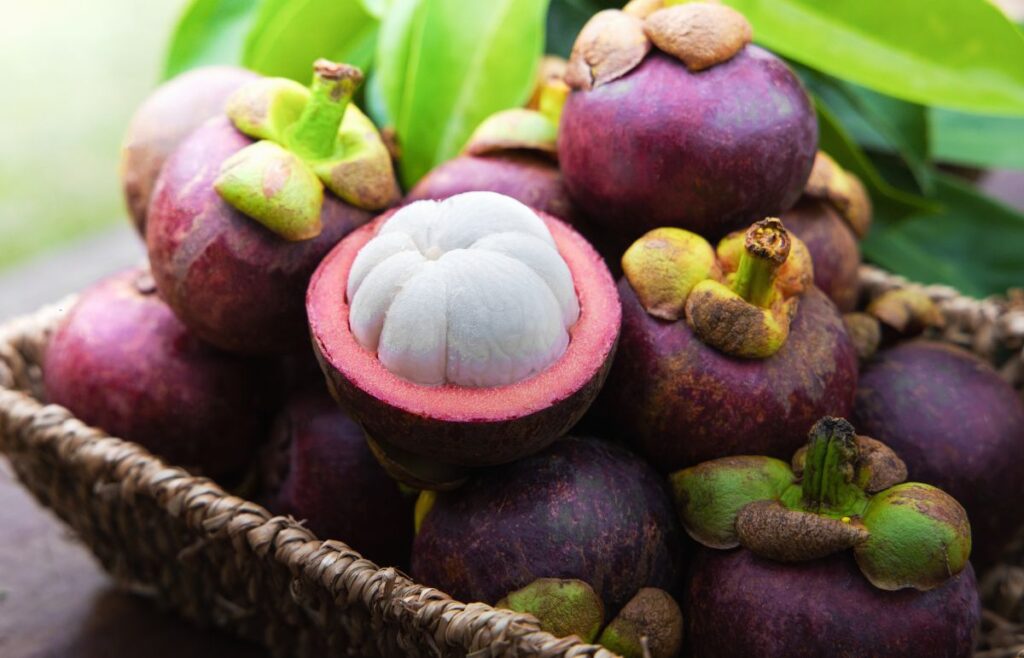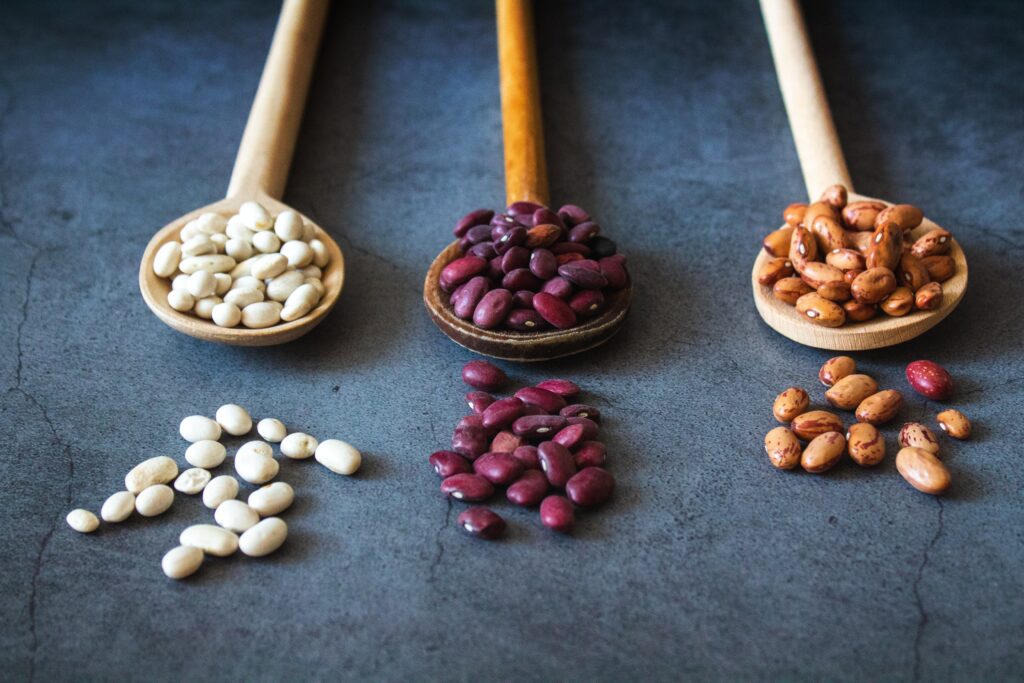Mangosteen is a tropical fruit that grows in Southeast Asia, specifically in Indonesia, Malaysia, Thailand, and the Philippines. It is popular for its sweet and tangy taste, which is often compared to a mix of peach, strawberry, and pineapple, with a subtle hint of citrus.
The fruit has a thick, dark purple rind or peel, encasing juicy, white flesh segments. The flesh is divided into several sections, similar to that of an orange, and contains seeds. Mangosteen is often enjoyed fresh, either on its own or added to fruit salads and desserts. It’s also used in various beverages, jams, and sauces.
Mangosteen benefits in many ways to your health due to various antioxidants, including xanthones, which are believed to help neutralize free radicals in the body. Free radicals are molecules that can damage cells and contribute to several chronic diseases.
Table of Contents
Nutritional Value of Mangosteen
Mangosteen is primarily packed with water and carbohydrates, with smaller amounts of fibre, vitamins, and minerals. These values may vary slightly depending on factors such as ripeness. It’s low in fat and protein. The nutritional value of mangosteen per 100 grams typically includes:
- Calories: 73 kcal
- Protein: 0.5 g
- Water: 81%
- Fat: 0.6 g
- Carbohydrates: 17.9 g
- Dietary Fiber: 1.8 g
- Sugar: 15.9 g
Vitamins:
- Vitamin C: 12 mg
- Vitamin A: 35 IU
- Vitamin B6: 0.018 mg
- Folate: 31 µg
Minerals:
- Potassium: 48 mg
- Calcium: 9 mg
- Magnesium: 13 mg
- Iron: 0.2 mg
- Zinc: 0.21 mg
The Superfood You Need to Know About Exploring Mangosteen Benefits
The fruit is mainly composed of water and carbohydrates, along with smaller amounts of fibre, vitamins, and minerals. Mangosteen is a rich source of antioxidants, particularly xanthones, which can aid in neutralizing harmful free radicals in the body. Below are some mangosteen benefits for your health:
Anti-inflammatory Effects:

Mangosteen has anti-inflammatory effects, primarily due to the presence of bioactive compounds such as xanthones. Xanthones are a type of polyphenol with antioxidant and anti-inflammatory properties. These compounds may help reduce inflammation by inhibiting pro-inflammatory enzymes and cytokines, which are molecules involved in the body’s inflammatory response.
By modulating inflammation, mangosteen benefits may potentially alleviate symptoms associated with inflammatory conditions such as arthritis, inflammatory bowel disease, and other inflammatory disorders.
Consuming mangosteen as part of a balanced diet may complement other anti-inflammatory strategies and promote overall health and well-being.
Immune System Support:

Mangosteen contains various antioxidants, including xanthones, which help neutralize harmful free radicals in the body. Free radicals can damage cells and weaken the immune system, making the body more susceptible to infections and illnesses. By scavenging free radicals, antioxidants in mangosteen benefits strengthen the immune system and reduce oxidative stress.
Mangosteen is a good source of vitamin C, an essential nutrient known for its immune-boosting properties. Vitamin C plays a crucial role in supporting the immune system by stimulating the production and function of white blood cells, which are responsible for fighting off pathogens.
Certain compounds in mangosteen may possess antimicrobial properties, which could help inhibit the growth of harmful bacteria, viruses, and fungi. By limiting the proliferation of pathogens, mangosteen benefits contribute to a stronger immune response.
Improve Heart Health:

Mangosteen has high levels of antioxidants called xanthones that can neutralize free radicals in the body. These free radicals can harm cells, leading to inflammation and oxidative stress. By reducing oxidative stress, mangosteen antioxidants may help protect against cardiovascular diseases such as atherosclerosis, characterized by plaque buildup in the arteries.
Mangosteen benefits regulate cholesterol levels and blood pressure, both of which are important factors in heart health. Certain compounds in mangosteen may help lower LDL (bad) cholesterol levels and raise HDL (good) cholesterol levels, as well as decrease blood pressure, thereby reducing the risk of heart disease and stroke.
Mangosteen may have vasodilatory effects, meaning it can help widen blood vessels and improve blood flow. This can enhance circulation and reduce the workload on the heart, potentially lowering the risk of conditions like hypertension and heart failure.
Enhance Digestive Health:

Mangosteen is an excellent source of dietary fibre, which is crucial for maintaining healthy digestion. Fibre helps to add bulk to the stool, softens it, and assists in moving it through the digestive system, preventing constipation and promoting regular bowel movements.
Adequate fibre intake has also been linked to a lower risk of digestive issues such as diverticulosis, haemorrhoids, and colorectal cancer.
Moreover, mangosteen may have prebiotic effects, which means it can support the growth and activity of beneficial bacteria in the gut microbiota. Maintaining a healthy balance of gut bacteria is essential for optimal digestion, nutrient absorption, and overall digestive health. By promoting the growth of beneficial bacteria, mangosteen may contribute to a healthy gut microbiome.
Moreover, mangosteen benefits protect the stomach from damage caused by alcohol, stress, and medications, thereby reducing the risk of gastrointestinal disorders.
Good for Skin Health:

Compounds found in mangosteen, such as xanthones, possess anti-inflammatory properties that may help reduce inflammation in the skin. Inflammation is linked with different skin conditions, such as acne, eczema, and psoriasis. By calming inflammation, mangosteen benefits help alleviate symptoms and promote clearer, healthier skin.
Mangosteen extracts protect the skin against UV-induced damage. The antioxidants in mangosteen benefits help neutralize free radicals generated by UV radiation and reduce the risk of sunburn, premature ageing, and skin cancer.
Mangosteen is a fruit used in skincare products for its potential to brighten and even out skin tone. It contains antioxidants that reduce dark spots and age spots, giving a radiant complexion. Its natural moisturizing properties keep skin hydrated and supple, preventing dryness and dehydration.
Anti-Cancer Effects:

Mangosteen contains a variety of antioxidants, including xanthones, which have potential anti-cancer properties. Antioxidants help neutralize free radicals, which are molecules that can damage cells and contribute to the development of cancer.
Chronic inflammation is associated with an increased risk of cancer. Some compounds found in mangosteen have anti-inflammatory properties, which could potentially help reduce inflammation and lower the risk of cancer development.
Potential anticancer effects of mangosteen extracts on breast, prostate, colon, and leukaemia cells have been observed. The extracts may inhibit cancer cell growth, induce apoptosis, and prevent cell spread. Consuming mangosteen benefits in preventing you from cancer.
Lower Blood Sugar Levels:

Mangosteen contains antioxidants, including xanthones, which have the potential to improve insulin sensitivity and reduce oxidative stress, both of which are factors that can affect blood sugar levels.
The use of mangosteen for lowering blood sugar levels in humans. The effects of mangosteen on blood glucose regulation in humans, and the results have been inconclusive or mixed.
If you have diabetes or are at risk of developing diabetes, it’s essential to manage your blood sugar levels through dietary and lifestyle modifications. While mangosteen benefits your health, including its antioxidant properties.
Regulate Blood Pressure:

Mangosteen contains antioxidants, such as xanthones, which have the potential to improve cardiovascular health. Antioxidants help neutralize free radicals, which can contribute to oxidative stress and damage blood vessels, potentially leading to hypertension.
Chronic inflammation has been linked to hypertension and other cardiovascular diseases. Mangosteen contains compounds such as xanthones that possess anti-inflammatory properties, which may help reduce inflammation and support cardiovascular health. Mangosteen benefits in controlling blood pressure.
Some suggested ways in which mangosteen benefits impact blood pressure include improving the function of the endothelium, which is the lining of the blood vessels, enhancing the production of nitric oxide – which helps to relax blood vessels – and reducing oxidative stress and inflammation.
Help in Weight Loss:

Mangosteen contains antioxidants, such as xanthones, which may have potential health benefits, including reducing inflammation and oxidative stress. These properties could indirectly support weight loss by promoting overall health and metabolism.
Some proposed mechanisms by which mangosteen benefits affect weight loss include improving metabolic function, increasing energy expenditure, and reducing fat accumulation.
Mangosteen is low in calories and high in fibre, which can help you feel full and satisfied without consuming excess calories. The fruit contains antioxidants that may help reduce inflammation and oxidative stress in the body, which can contribute to weight gain and other health issues.
Relieve Body Pain:

Inflammation is often associated with pain, whether it’s from conditions like arthritis, tendonitis, or other inflammatory disorders. Xanthones found in mangosteen have anti-inflammatory properties, which could help reduce inflammation and relieve associated pain.
Mangosteen contains antioxidants, which help neutralize free radicals and reduce oxidative stress in the body. While oxidative stress itself may not directly cause pain, it can contribute to inflammation and tissue damage, exacerbating pain symptoms. By reducing oxidative stress, antioxidants in mangosteen benefits indirectly help alleviate pain.
Mangosteen extracts or isolated compounds may have analgesic (pain-relieving) effects. These effects have been attributed to various mechanisms, including modulation of inflammatory pathways and inhibition of pain receptors.
Final Words
Mangosteen is a delicious tropical fruit that is highly valued for its potential health benefits. It has earned the nickname “queen of fruits” due to its rich nutritional profile and delightful taste. The fruit is about the same size as a tangerine and has a thick, dark purple rind that covers juicy, white flesh segments.
Mangosteen is a valuable fruit due to its rich antioxidant content, particularly xanthones. It has anti-inflammatory properties that can promote heart, digestive, and skin health. It’s important to consume it as part of a healthy diet and lifestyle.
Mangosteen is a sweet and tangy fruit, enjoyed fresh or used to make beverages, jams, and sauces. It has a unique flavour, a mix of peach, strawberry, pineapple, and citrus.
Mangosteen is typically enjoyed fresh and can be consumed on its own or added to fruit salads and desserts. This fruit is also used to make a variety of beverages, jams, and sauces.
A fitness blogger shares health and fitness tips that could help achieve your goals. A fitness enthusiast is addicted to staying fit and healthy.












